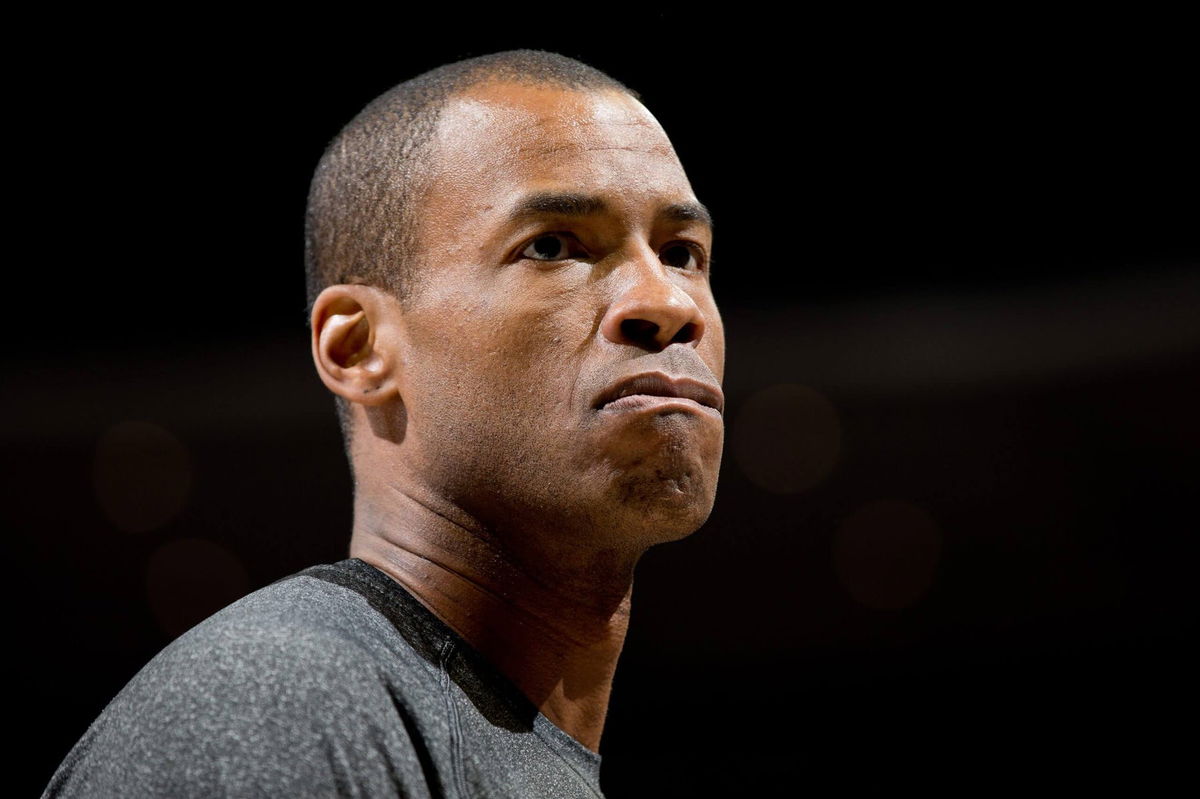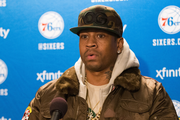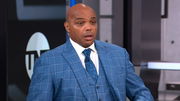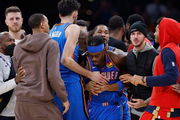

Jason Collins built his basketball legacy on resilience, teamwork, and quiet leadership. From starring at Stanford University, where he earned All-American honors, to making his NBA debut in 2001 with the New Jersey Nets, Collins carved out a 13-year career defined less by flashy stats and more by consistency and grit. He was a steady presence in multiple playoff runs, including back-to-back Finals appearances with the Nets, and his journey from college standout to dependable NBA veteran made him a respected figure both on and off the court. Now, as he faces new challenges, we take a closer look at the life and legacy of Jason Collins.
Watch What’s Trending Now!
Who is Jason Collins?
Jason Collins is more than a former professional basketball player—he’s a symbol of courage, resilience, and groundbreaking advocacy. Born December 2, 1978, in Northridge, California, Jason grew up with his twin brother Jarron in a supportive family that valued education, integrity, and character as much as athletic excellence. He made his mark early at Harvard-Westlake School, then at Stanford University, where his talent, work ethic, and leadership on the court began to draw attention beyond the box score.
ADVERTISEMENT
On September 11, 2025, NBA Communications issued an official statement from New York confirming that Jason Collins is undergoing treatment for a brain tumor. The statement requested privacy for Jason and his family during this difficult time.
The following statement was issued today on behalf of Jason Collins and his family: pic.twitter.com/36lKwB7NiR
— NBA Communications (@NBAPR) September 11, 2025
As the basketball world rallies behind him, Collins’ life and legacy continue to inspire both on and off the court. And it starts from the very beginning.
ADVERTISEMENT
Jason Collins’ early life: from California roots to Harvard courts
Jason Paul Collins grew up in the San Fernando Valley with his twin brother, Jarron. From an early age, the two were inseparable, whether it was in the classroom, on the playground, or on the basketball court. They often played against each other in the driveway, a competitive dynamic that sharpened both of their skills.
ADVERTISEMENT
At Harvard-Westlake School in Los Angeles, the Collins twins quickly made their presence felt. Standing over 7 feet tall, Jason became a force in the paint, using his defensive instincts and size to control games. Alongside Jarron, the team captured two California state championships, cementing their reputation as one of the best high school duos in the country. By the time they graduated, they had become household names in Southern California basketball circles.
Top Stories
Allen Iverson Under Fire After NBA Champion Accuses 76ers Legend of Misconduct

“Rest in Peace”: Charles Barkley Sends Prayers to NBA Legend Who’s Still Alive

Celtics Legend Paul Pierce Faces Paternity Lawsuit After Ignoring Woman’s Plea

What Happened Between Lu Dort and Jeremiah Fears? All Hell Breaks Loose as Fight Erupts in Thunder-Pelicans

ESPN Shams Charania’s Austin Reaves Injury Update Leaves Laker Nation Furious

Jason Collins’ college career at Stanford was shaped by both setbacks and triumphs. He endured early injuries, including a knee issue that forced him to redshirt his first year and a dislocated wrist that limited him in the 1998-99 season. Once healthy, he emerged as a reliable force in the frontcourt, averaging 8.3 points and 6.1 rebounds in 1999-2000. His breakout came during the 2000-01 campaign, when he averaged 14.5 points and a team-leading 7.8 rebounds per game as Stanford posted a 31-3 record, captured the Pac-10 title, and reached the NCAA Elite Eight.
ADVERTISEMENT
Jason Collins’ parents and siblings
Jason’s journey would not have been possible without the support of his parents, Portia and Paul Collins. Portia, a proud and steady presence, emphasized education and kindness above all. Paul, equally devoted, nurtured his sons’ love for basketball while ensuring they never lost sight of life’s bigger lessons.
Family support was especially critical when Jason publicly came out in 2013. In his sit-down with Oprah Winfrey, Jason recalled telling Jarron first. “I needed him to know before anyone else,” Jason said. “He told me, ‘I’ve got your back. Always.’ That’s the kind of brother he’s been my whole life.”
The Collins family is deeply rooted in achievement beyond basketball. Jason’s sister-in-law, Elsa Collins, is an activist and entrepreneur who has worked on social justice initiatives and educational advocacy. The family’s broad network of success stories gave Jason a foundation of resilience and courage, qualities that would define his public and private life.
ADVERTISEMENT
Jason Collins’ NBA journey: A career defined by teamwork and tenacity
In the 2001 NBA Draft, Jason Collins was selected 18th overall by the Houston Rockets, though he was immediately traded to the New Jersey Nets. His rookie season saw him step into a team that was building toward championship contention. Jason became a defensive stalwart, known for his ability to defend larger post players, set bone-crushing screens, and contribute in ways that didn’t always show up on stat sheets.
His time with the Nets included two straight trips to the NBA Finals in 2002 and 2003. Though the Nets fell short both years, Collins’ contributions were critical. He was praised by then-head coach Byron Scott as one of the team’s most dependable players. Throughout his career, Jason played for seven NBA teams, including the Memphis Grizzlies, Minnesota Timberwolves, Atlanta Hawks, Boston Celtics, Washington Wizards, and Brooklyn Nets. He was often signed for his leadership and presence in the locker room as much as for his skills on the court.
ADVERTISEMENT
Over 13 seasons, Jason played in more than 700 games. While his averages of 3.6 points and 3.7 rebounds per game might not capture headlines, his role as a teammate and leader was widely recognized. His professionalism made him a respected veteran wherever he went, a reputation that has outlasted his playing days. Collins now serves as an ambassador for the NBA and is involved in NBA Cares and public speaking.
A historic moment: coming out as the first openly gay NBA player
In April 2013, Jason Collins made history. In a powerful essay published by Sports Illustrated, he wrote: “I’m a 34-year-old NBA center. I’m Black. And I’m gay.” With those words, Collins became the first openly gay athlete in any of the four major North American professional sports leagues.
ADVERTISEMENT
The response was overwhelming. President Barack Obama personally called him to commend his courage. Former teammates and opponents voiced their support. Kobe Bryant tweeted his respect. The NBA Commissioner at the time, David Stern, issued a statement praising Collins for his honesty. During his later conversation with Oprah, Collins reflected on the moment: “It was scary. I didn’t know how the world would react. But the relief of finally living my truth was worth every second of fear.”
His decision opened doors for other athletes across sports to live authentically, proving that representation matters. Stanford warmly embraced Jason Collins’ coming out, too. Athletic Director Bernard Muir said, “One of our Stanford sons … has taken a leadership role on this topic. I applaud his decision to be true to his identity and, from his own words, start this conversation in major professional sports.”
Assistant coach Mark Madsen echoed the sentiment, noting, “He is not defined by basketball, or by his decision to come out. What defines him is the way he treats other people, his intellectual pursuits and the contribution he’s made to this university and every team or community he has been a part of.”
ADVERTISEMENT
In fact, Collins’ personal life reflects the same values of authenticity and love that guided his career.
Jason Collins’ partner: meet Brunson Green
In 2014, he met Brunson Green, an Oscar-nominated producer best known for his work on the acclaimed film The Help. Their relationship blossomed over shared passions for storytelling, advocacy, and community.
In 2023, Jason proposed to Brunson during a Pride Night event at a Los Angeles Lakers game, a public gesture that underscored his lifelong commitment to visibility and representation. The moment was met with cheers from the crowd, symbolizing how far both sports and society had come since Jason’s 2013 announcement.
In May 2025, the couple married in Austin, Texas, during an intimate ceremony over Memorial Day weekend. Surrounded by family, friends, and longtime supporters, the wedding was a celebration not just of love, but of progress.
Jason Collins’ net worth: A life beyond Basketball
Jason Collins’ estimated net worth is around $16 million, accumulated from his NBA contracts, endorsement deals, speaking engagements, and advocacy work. While he never had the superstar contracts of some peers, Collins was financially savvy, building a steady foundation during and after his career.
Much of his post-NBA life has been dedicated to causes larger than himself. He has partnered with organizations like the Human Rights Campaign, delivered speeches at universities and conferences, and worked with the NBA on initiatives promoting inclusivity and mental health awareness.
Jason Collins’ achievements and legacy
Jason Collins’ impact extends far beyond basketball. His life and career are defined by:
Trailblazing Courage: Becoming the first openly gay player in the NBA, inspiring countless athletes and fans.
Advocacy: Promoting LGBTQ+ rights, mental health awareness, and community initiatives through speaking engagements and partnerships.
Role Modeling: Leading by example in a league where representation once felt impossible for many.
Humanitarian Work: Supporting charities and grassroots causes with his husband, Brunson Green, focusing on youth empowerment and inclusivity.
Collins has received numerous honors, including recognition from GLAAD, the Human Rights Campaign, and the NBA itself. His name will forever be remembered not just in box scores but in history books documenting the evolution of sports and society.
Now, as he faces his health battle with a brain tumor, the world that once cheered for his basketball career is uniting behind him in support. His legacy reminds us that courage isn’t about being fearless—it’s about choosing honesty even when the stakes are high.
ADVERTISEMENT
ADVERTISEMENT
ADVERTISEMENT